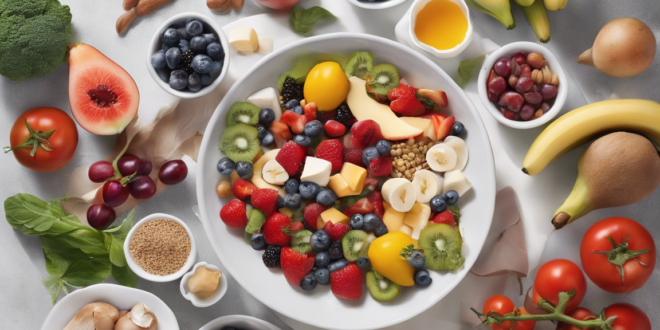Healthy Foods to Help Manage Stress: A Comprehensive Nutritional Guide
In today’s fast-paced world, stress has become an inevitable part of modern life. While many people turn to various coping mechanisms, one of the most powerful and often overlooked strategies for managing stress is through nutrition. The food we consume plays a crucial role in our body’s ability to combat stress, regulate hormones, and maintain emotional balance.
Understanding the Connection Between Diet and Stress
Stress triggers a complex physiological response in our body, releasing hormones like cortisol and adrenaline. These hormones can dramatically impact our metabolism, immune system, and overall well-being. By making strategic dietary choices, we can help our bodies better manage stress and promote emotional resilience.
Top Stress-Reducing Foods to Incorporate into Your Diet
1. Omega-3 Rich Foods
Salmon, mackerel, and other fatty fish are packed with omega-3 fatty acids, which have been scientifically proven to reduce stress hormones and combat inflammation. These foods help regulate cortisol levels and promote brain health, making them essential for stress management.
2. Complex Carbohydrates
Whole grains like quinoa, brown rice, and oatmeal help boost serotonin production, a neurotransmitter that promotes feelings of calm and well-being. These foods provide steady energy and help stabilize mood throughout the day.
3. Antioxidant-Rich Fruits and Vegetables
Berries, dark leafy greens, and colorful vegetables are loaded with antioxidants that help combat the oxidative stress caused by chronic tension. Blueberries, spinach, and kale are particularly effective in supporting the body’s stress response.
Nutrient Powerhouses for Stress Relief
Magnesium-Rich Foods
Almonds, spinach, and avocados are excellent sources of magnesium, a mineral crucial for reducing stress and promoting relaxation. Magnesium helps regulate neurotransmitters and can significantly improve your body’s stress response.
Probiotic Foods
Yogurt, kefir, and fermented foods support gut health, which is directly linked to mental well-being. The gut-brain connection means that a healthy digestive system can help manage stress more effectively.
Foods to Avoid When Managing Stress
While focusing on stress-reducing foods, it’s equally important to minimize consumption of substances that can exacerbate stress:
• Caffeine: Excessive coffee and energy drinks can increase anxiety
• Processed sugars: These cause rapid blood sugar fluctuations
• Alcohol: While it might seem like a stress reliever, alcohol can disrupt sleep and increase anxiety
Meal Planning Strategies for Stress Management
Creating a balanced meal plan is crucial for maintaining consistent energy and mood. Consider these tips:
• Eat regular, balanced meals
• Include protein in every meal
• Stay hydrated
• Prepare meals in advance to reduce daily stress
Supplemental Support for Stress Reduction
In addition to whole foods, certain supplements can support stress management:
• Vitamin B Complex: Supports nervous system health
• Adaptogenic herbs like ashwagandha
• Vitamin D
• Omega-3 supplements
Lifestyle Integration: Beyond Diet
While nutrition is critical, comprehensive stress management requires a holistic approach. Combine your dietary changes with:
• Regular exercise
• Adequate sleep
• Meditation
• Mindfulness practices
Personalized Nutrition: Consulting Professionals
Every individual’s stress response and nutritional needs are unique. Consider consulting a registered dietitian or nutritionist who can provide personalized guidance tailored to your specific health requirements and stress management goals.
Conclusion: Empowering Your Health Through Nutrition
Managing stress through nutrition is a powerful, proactive approach to overall well-being. By making informed dietary choices, you can support your body’s natural stress response, improve mental resilience, and enhance your quality of life. Remember, small, consistent changes can lead to significant improvements in how you experience and manage stress.
Start your journey today by incorporating these stress-reducing foods and strategies into your daily routine. Your body and mind will thank you.
 Good Calories Guide GoodCalories Guide focuses on nutrition, healthy eating, and overall wellness. The site offers practical insights into evidence-based dietary practices, including tips for specific lifestyles such as veganism, keto, and family-friendly meal planning. It also addresses unique nutritional needs for individuals with conditions like diabetes or food allergies, while providing quick and accessible recipes to make healthy living a sustainable and enjoyable choice.
Good Calories Guide GoodCalories Guide focuses on nutrition, healthy eating, and overall wellness. The site offers practical insights into evidence-based dietary practices, including tips for specific lifestyles such as veganism, keto, and family-friendly meal planning. It also addresses unique nutritional needs for individuals with conditions like diabetes or food allergies, while providing quick and accessible recipes to make healthy living a sustainable and enjoyable choice.


